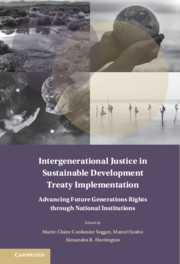 Intergenerational Justice in Sustainable Development Treaty Implementation
Intergenerational Justice in Sustainable Development Treaty Implementation Book contents
- Intergenerational Justice in Sustainable Development Treaty Implementation
- Treaty Implementation for Sustainable Development
- Intergenerational Justice in Sustainable Development Treaty Implementation
- Copyright page
- Contents
- Figures
- Tables
- Notes on Contributors
- Foreword
- Acknowledgements
- Abbreviations and Acronyms
- 1 Introduction
- 2 The Theoretical Framework for International Legal Principles of Intergenerational Equity and Implementation through National Institutions
- Part I Introduction to Treaty Law on Intergenerational Justice and Codifying Sustainability
- Part II Key Challenges in Domestic Implementation of Intergenerational Justice
- Part III Law and Policy Innovations for Intergenerational Justice
- Part IV Implementing Sustainability through National Institutions: Case Studies
- National Case Studies
- Comparative Insights
- 29 A Comparative Analysis of Model Institutions: Diversity in Reaching Common Goals
- 30 Comparing Progress in Intergenerational Governance
- 31 International Institutions for Future Generations and Democratic Legitimacy
- Part V Regional Trends in Intergenerational Justice
- Part VI Future Trends
- Afterword
- Table of Authorities
30 - Comparing Progress in Intergenerational Governance
from Comparative Insights
Published online by Cambridge University Press: 15 October 2021
- Intergenerational Justice in Sustainable Development Treaty Implementation
- Treaty Implementation for Sustainable Development
- Intergenerational Justice in Sustainable Development Treaty Implementation
- Copyright page
- Contents
- Figures
- Tables
- Notes on Contributors
- Foreword
- Acknowledgements
- Abbreviations and Acronyms
- 1 Introduction
- 2 The Theoretical Framework for International Legal Principles of Intergenerational Equity and Implementation through National Institutions
- Part I Introduction to Treaty Law on Intergenerational Justice and Codifying Sustainability
- Part II Key Challenges in Domestic Implementation of Intergenerational Justice
- Part III Law and Policy Innovations for Intergenerational Justice
- Part IV Implementing Sustainability through National Institutions: Case Studies
- National Case Studies
- Comparative Insights
- 29 A Comparative Analysis of Model Institutions: Diversity in Reaching Common Goals
- 30 Comparing Progress in Intergenerational Governance
- 31 International Institutions for Future Generations and Democratic Legitimacy
- Part V Regional Trends in Intergenerational Justice
- Part VI Future Trends
- Afterword
- Table of Authorities
Summary
For humanity and the Earth, it is crucial that present institutions learn to respect and honour the rights of future generations and to consider the needs of those who are yet to come. The rights of future generations are starting to be recognised as an essential part of policy decisions and even as a legal requirement in an increasing number of countries. Indeed, some countries and communities have begun to design innovative instruments to represent the voices of future generations in their policy-making processes, and to better realise these rights. The need to respect and realise the rights of future generations has also been adopted by the international community through treaty law and through the jurisprudence of eminent courts and tribunals such as the ICJ. Indeed, the UNGA now considers the rights of future generations in its global deliberations, and several proposals have been generated among experts for the creation of new international instruments to represent the voices of future generations in global policy making. Perhaps the most concrete form of policy guidance, and arguably the most visible place, for future generations in the UN context is the 2015 SDGs. At this point in time, it is helpful to summarise and analyse the new domestic and international institutions that work to deliver on the rights of future generations. Indeed, surveying the more progressive national innovations and the principal international trends in this domain make new options possible for policy makers wishing to establish novel instruments to adequately protect the rights of future generations at national and international levels.
- Type
- Chapter
- Information
- Intergenerational Justice in Sustainable Development Treaty ImplementationAdvancing Future Generations Rights through National Institutions, pp. 576 - 596Publisher: Cambridge University PressPrint publication year: 2021
